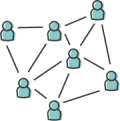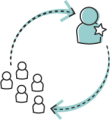Learning Circles

What are learning circles
Learning Circles are facilitated, small group, peer-learning experiences. They Involve carefully matched leaders working at similar levels cross-industry or within the same organisation.
Members contract to meet together at regular intervals to share their leadership/management experiences and reflect on their learning as part of their career journeys.
Through deep dialogue members focus on the internal journey of leadership. Greater levels of self-awareness and mindfulness are developed through contemplation, reflection and learning from others exploring both success and failure.
Skills and competence in communication, problem solving, listening, silence, coping with complexity, ambiguity and expressing vulnerability are refined through observation and practice.
Key Features of Learning Circles:

A highly skilled facilitator:

Peer group learning:
Groups of 6-12 people carefully matched to ensure that they are working at similar levels of management/leadership.
Members take turns in leading in-depth reflective discussion related to their own issues and experiences, including listening and responding to feedback from other group members as well as participating in group problem solving exercises.

Regular meeting time
The meetings extend over a number of hours allowing for enough time for each member to have in-depth focus on their

Safe environtment for self-disclosure

Access to experts
covering specific areas of leadership and management: Based on identified issues of common interest guest speakers may be invited to lead focussed discussion on specific topics as part of meetings.

Research findings on the nature of transformational leadership, stress the importance of the so-called soft skills of leadership (emotional intelligence, inspiration, communication, mentoring and coaching) that require self-reflection, insight and development of contemplative practice and learning. Learning Circles provide an ideal and unique environment for this learning.

Opportunities for presenting issues to a group of peers for detailed listening, analysis and feedback can be a uniquely powerful learning experience enabling members to clarify their own thinking, view issues from a new perspective, determine previously unimagined solutions or strategies and gain new insights into their own leadership style and practice.

Learning Circles provide an opportunity to be exposed to leading-edge leadership and management theory and research strategies. Engagement in in-depth discussions about critical issues impacting on leadership and management within the Tasmanian and Australian context with other leaders and managers working at similar levels is facilitated.

Leadership can at times be a lonely and confusing experience with few places for emerging leaders, and even fewer for experienced leaders to safely explore their leadership dilemmas, management issues, learning edges and career transition points. Learning Circles provide a safe and effective place to engage in peer-learning and growth of self-knowledge. They allow for exploration of complexity and ambiguity and enable development of the capacity to lead from the place of ‘what is the right thing to do?’..
Benefits of Learning Circles:

There are key transition periods in the careers of leaders/managers that can be readily assisted through the peer support of other people experiencing similar career stages. These include the aspiring manager, the new team leader, formation of a new business, managing significant workplace change, the newly appointed executive or senior manager, taking on the CEO job and managing a major career transition. Where there is interest/demand Groups can also be customized to particular industries or service-setting issues allowing for in depth exploration and learning.

Learning Circles can provide a flexible and customized learning environment that can easily adapt to the emergent interests and learning needs of group members through access to focused topic discussion, and input from the facilitator and guest speakers.

Learning Circles provide an opportunity to learn from others’ experiences and expressed styles of leadership.

Learning Circles provide an opportunity to expand professional and business networks and develop deep and lasting relationships with fellow leader/managers working within Tasmania.

